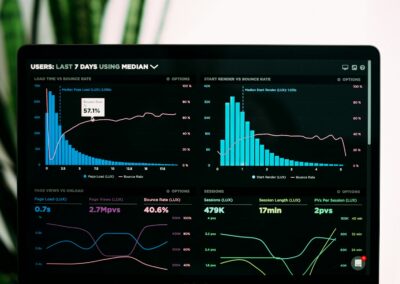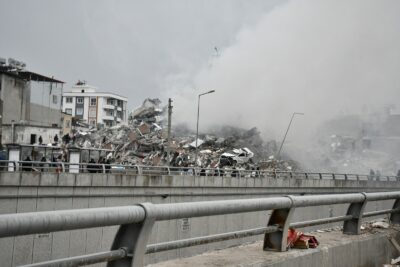Enhancing Flood Prediction with Machine Learning in the Middle East
Revolutionizing Flood Prediction through Machine Learning
The application of machine learning algorithms in flood prediction represents a significant advancement in the field of disaster management. These algorithms analyze complex data sets, identifying patterns that traditional methods might overlook. For regions such as Saudi Arabia and the UAE, where flash floods can have devastating impacts, machine learning offers a powerful tool for improving prediction accuracy and response times. By integrating data from various sources, including weather forecasts, river levels, and historical flood data, machine learning models can generate more reliable and timely flood warnings.
In Saudi Arabia, cities like Riyadh are leveraging machine learning to enhance their flood prediction systems. The city’s rapid urbanization and infrastructure development require robust flood management strategies to mitigate potential risks. Machine learning algorithms can process vast amounts of data quickly, providing real-time insights that are crucial for effective flood response. This technology not only helps in predicting the occurrence of floods but also in understanding their potential impact on urban areas.
Dubai, known for its innovative approach to technology, is also adopting machine learning in its flood management initiatives. The city’s unique geography and rapid expansion make it vulnerable to flooding, especially during seasonal rains. By utilizing machine learning, Dubai can develop more accurate flood models that inform infrastructure planning and emergency preparedness. This proactive approach ensures that the city remains resilient in the face of natural disasters, safeguarding its residents and assets.
The Role of Artificial Intelligence in Flood Prediction
Artificial intelligence (AI) plays a crucial role in enhancing the capabilities of machine learning algorithms used in flood prediction. In the Middle East, where the effects of climate change are increasingly evident, AI-driven models offer a proactive solution to managing flood risks. By continuously learning from new data, these models can adapt to changing environmental conditions, improving their predictive accuracy over time. This dynamic nature of AI is particularly beneficial for regions like Saudi Arabia and the UAE, where weather patterns can be unpredictable.
In Riyadh, AI-powered flood prediction systems are becoming an integral part of the city’s disaster management framework. These systems analyze data from multiple sensors placed across the city, monitoring real-time changes in weather and water levels. The use of AI ensures that the data is processed efficiently, providing actionable insights to emergency response teams. This integration of AI and machine learning enhances the city’s ability to respond swiftly and effectively to potential flood threats.
Dubai is also at the forefront of utilizing AI in flood prediction. The city’s Smart Dubai initiative aims to harness advanced technologies to improve urban living conditions. By incorporating AI into its flood prediction systems, Dubai can simulate various flood scenarios, assessing their impact on different parts of the city. This foresight allows city planners and emergency services to develop targeted strategies for flood prevention and mitigation, ensuring the safety and well-being of its residents.
Blockchain and Data Security in Flood Prediction
Blockchain technology, with its emphasis on data security and transparency, is finding its way into the realm of flood prediction. In regions like the UAE and Saudi Arabia, where data integrity is paramount, blockchain offers a reliable solution for managing and sharing flood prediction data. By creating a decentralized and tamper-proof ledger, blockchain ensures that all stakeholders have access to accurate and up-to-date information, facilitating coordinated disaster response efforts.
In the context of flood prediction, blockchain can be used to securely store data collected from various sensors and monitoring stations. This data can then be accessed by authorized personnel, including government agencies, emergency services, and urban planners. In Riyadh, for example, blockchain technology can enhance the city’s flood management system by ensuring that critical data is not compromised. This level of security is essential for making informed decisions during flood events, where timely and accurate information can make a significant difference.
Dubai’s embrace of blockchain technology further underscores its commitment to innovation in disaster management. The city’s blockchain strategy aims to make Dubai the first blockchain-powered government by 2021. By integrating blockchain with flood prediction systems, Dubai can ensure the integrity and availability of critical data, supporting efficient and effective flood response. This approach not only enhances data security but also promotes transparency and trust among stakeholders involved in disaster management.
Leadership and Project Management in Implementing Advanced Technologies
Effective leadership and project management are crucial for the successful implementation of advanced technologies in flood prediction. Business executives, mid-level managers, and entrepreneurs in Saudi Arabia and the UAE must possess the skills and knowledge to drive these initiatives forward. This involves understanding the technical aspects of machine learning, AI, and blockchain, as well as the ability to lead cross-functional teams and coordinate efforts across various sectors.
In Riyadh and Dubai, where technological innovation is a key driver of economic growth, leaders must prioritize the adoption of advanced flood prediction technologies. This includes investing in training programs for staff, fostering partnerships with technology providers, and staying abreast of the latest developments in the field. By cultivating a culture of innovation and continuous improvement, leaders can ensure that their organizations are well-prepared to address the challenges posed by flooding and other natural disasters.
Project management skills are equally important in this context. The deployment of machine learning and AI for flood prediction requires careful planning, execution, and monitoring. Project managers must be adept at managing resources, timelines, and stakeholder expectations, ensuring that projects are delivered on time and within budget. This is particularly relevant in the Middle East, where large-scale infrastructure projects are common, and the stakes are high.
Conclusion: Building Resilience through Technology
The integration of machine learning, AI, and blockchain in flood prediction represents a significant step forward in disaster management. By leveraging these advanced technologies, Saudi Arabia and the UAE can enhance their ability to predict and respond to flood events, protecting their urban environments and ensuring the safety of their residents. The proactive adoption of these technologies underscores the commitment of these nations to innovation and resilience.
Leadership and project management skills are essential for the successful implementation of these technologies. Business executives, mid-level managers, and entrepreneurs must be proactive in adopting and promoting advanced flood prediction technologies within their organizations. By doing so, they can contribute to building a resilient future that is capable of withstanding the challenges posed by natural disasters.
In conclusion, the strategic use of machine learning and AI in flood prediction offers a powerful tool for enhancing disaster preparedness and response. With the right leadership, management skills, and technological innovations, Saudi Arabia and the UAE can lead the way in creating safer, more resilient urban environments for their citizens.
#MachineLearning #FloodPrediction #SaudiArabia #UAE #Riyadh #Dubai #ArtificialIntelligence #ModernTechnology #BusinessSuccess #Leadership #ProjectManagement























